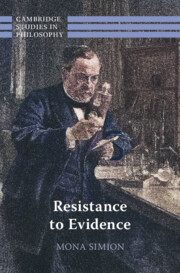Resistance to Evidence
We have increasingly sophisticated ways of acquiring and communicating knowledge, but efforts to spread this knowledge often encounter resistance to evidence. The phenomenon of resistance to evidence, while subject to thorough investigation in social psychology, is acutely under-theorised in the philosophical literature. Mona Simion’s book is concerned with positive epistemology: it argues that we have epistemic obligations to update and form beliefs on available and undefeated evidence. In turn, our resistance to easily available evidence is unpacked as an instance of epistemic malfunctioning. Simion develops a full positive, integrated epistemological picture in conjunction with novel accounts of evidence, defeat, norms of inquiry, permissible suspension, and disinformation. Her book is relevant for anyone with an interest in the nature of evidence and justified belief and in the best ways to avoid the high-stakes practical consequences of evidence resistance in policy and practice. This title is also available as Open Access on Cambridge Core.
Mona Simion is Professor of Philosophy and Director of the COGITO Epistemology Research Centre at the University of Glasgow. Her publications include Sharing Knowledge (2021) and Shifty Speech and Independent Thought (2021).

